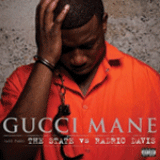
Gucci Mane
The State vs. Radric Davis / Free Gucci
(Warner Brothers / Mad Decent; 2010)
By Clayton Purdom | 24 January 2010
We live in a post-Lil’ Wayne world. Hold on: give me a second here. Like it or not, Wayne’s success exists, seismically, critically and commercially, and in the wake of that contentious jumbo jet of an artist comes others, of course. This is how money and music and particularly hip-hop work. What’s interesting is to see how others have learned from Wayne’s strange matriculation. Drake whiffs Wayne’s melancholy and opulent wordplay and spirals along in the slipstream; everyone from Hova to OJ Da Juiceman emulates the flamboyant delivery; but Gucci Mane sees a jumbo jet and, kid-like, spreads his arms out and takes off in curlicues, airplane sounds asputter, like he can simply turn into one.
What is interesting (as a critic) and sort of heart-tuggingly beautiful (as a fan of human excellence) about this is that he has. Via sheer volume and little beyond that, Gucci Mane has transformed into a formidable artist, burying his competition almost literally beneath a mountain of music, and he has done so without changing the inherent disposability of his aesthetic: dirt-cheap Casio production, AABB rhyme schemes, inelastic syntax. But his swagger is astonishing, and only growing in confidence. The pleasure spot he hits repeatedly on mixtapes is an inexhaustible one (so far, at least), meaning the volume of output meets constantly appreciative ears. He is a master of the on-beat drop-in and the easily memorized fuck-you couplet. His hand with catchphrases is preternatural (“Skurt!”), and when he doesn’t outsource his hook these qualities can congeal into something absolutely mesmerizing. If unacquainted, see for proof the popular Bird Flu mixtape, or (my favorite) EA Sportscenter, which I wrote about here. Both are, of course, free.
Two more recent releases attempt to extract from this oceanic body of work some of its appeal, repackaging it for new audiences. After all, if it worked for Wayne…right? The State vs Radric Davis, Gucci’s first Best Buy-available release since the never-heard 2007 Back to the Trap House, is an unabashed shot at Carter 3 (2008)-type crossover success. It is High Profile rap music. He’s buttoned up here, ready for the cameras, and on occasion, things work ecstatically. “Lemonade” has made the blog rounds and proven it’s got both ride and bounce for miles, all Gucci leer and “Hard Knock Life” chorus shift. Polow da Don and Usher continue their fruitful collaboration on “Spotlight,” and Gucci smartly gives them centerstage, riding the beat where necessary and ducking out while Ursher does like pirouettes and hatflips and shit. Elsewhere the ineluctable mixtape-ness of Gucci’s appeal fails to transition to the glossier beats, as on the idiotic “Classical,” which samples bombastic classical music and that’s as far as I can figure out its name, and “Bingo,” on which Gucci struggles to circumcise his flow and, well, misses. (Soulja Boy guests.)
But Gucci looks best in his pricy new wardrobe on the Keyshia Cole duet “Bad Bad Bad,” its buoyant verse and steam-powered hook coming together something like “Empire State of Mind” in its baffling universality. Not that r(ap)&b is Gucci’s true calling—I think the flow’s got a transformation left—but “Bad Bad Bad” does pinpoint an accessibility to Gucci Mane sorely lacking from the ear-piercing, almost avant-garde cheapness of his mixtape work. On “Dangers Not A Stranger,” the first track on the new Diplo-produced mixtape Free Gucci, Diplo extrapolates the clarity and tenderness of a Gucci vocal performance and layers it over a Mariah Carey sample, leaving the shine squarely on the emcee. One would that more of the mixtape’s It-List of producers gave the emcee the same respect. While FlyLo intriguingly sets him within a stormcloud of dissonance and Bird Peterson makes the “Dope Boys” hook drop harder than most speakers are prepared for, much of the mixtape is given to dubstep showboating, glo-fi cuteness or merely obtrusive tempo play. Twice, producers emphasize guest verses instead of Gucci’s—which is fine, Gucci isn’t the center of the universe, but elasticizing his appeal is ostensibly the idea behind this entire release. Free Gucci is still worthwhile—and, fuck, free!—but varies between unfinished in its best moments and unfocused in its worst.
But I mean like “Dope Boys” is gonna break your subwoofer regardless of all this, and that’s pretty much exclusively what matters here anyway. Gucci’s got a lot of bangers left in him, and both of these releases prove they may come in unexpected forms even if they (the albums) portend to fix something that sure as fuck ain’t broke (see: “Fast Break”). Gucci’s standing at one of those mythic precipices that rappers are always pushing up against right now, with as much support as he’s gonna get behind him doing things as he’s done them, and with another prison stretch, two major label releases and who knows how many other mixtapes planned in the immediate fiscal future, his future could take any number of forms. A label-pleasing Weezy crossover? A Gibbs-ish retreat to the shelter of mixtape culture? What about those ecclesiastical shout-outs to fellow Georgians the Block Beattaz? Could he court the new audience Diplo brings him? And so on. But here’s hoping it’s none of these paths—here’s hoping he takes off his own way from here, with studious admirers spiraling around his jetstream.





